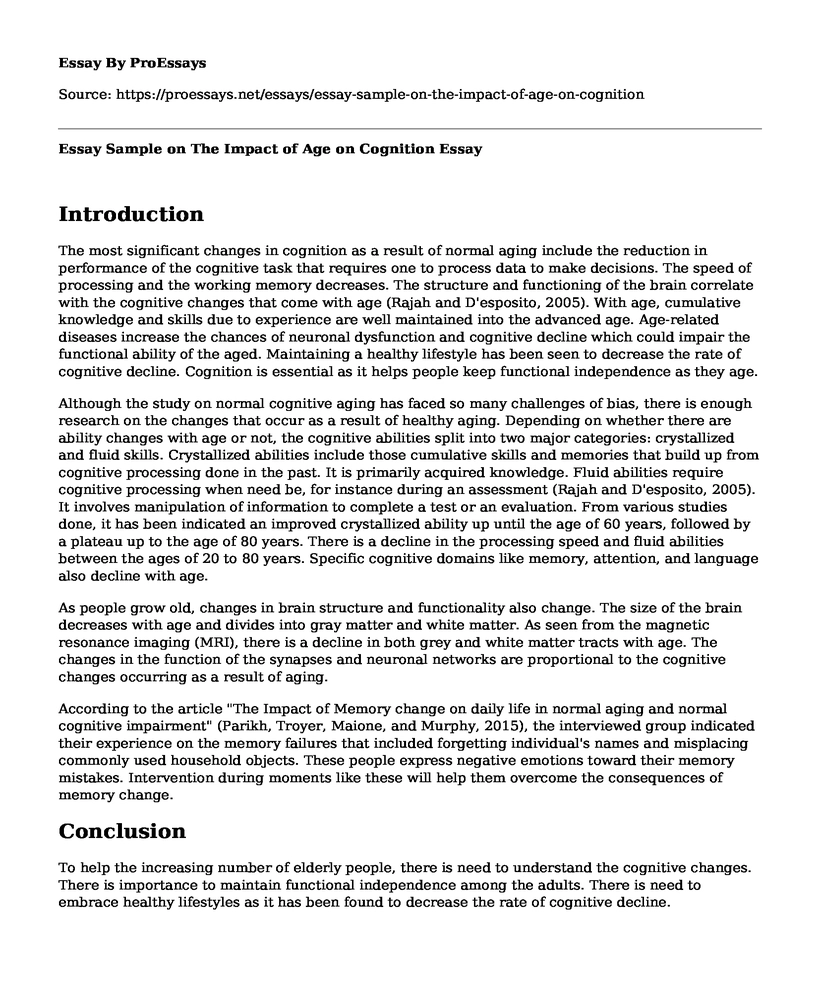Introduction
The most significant changes in cognition as a result of normal aging include the reduction in performance of the cognitive task that requires one to process data to make decisions. The speed of processing and the working memory decreases. The structure and functioning of the brain correlate with the cognitive changes that come with age (Rajah and D'esposito, 2005). With age, cumulative knowledge and skills due to experience are well maintained into the advanced age. Age-related diseases increase the chances of neuronal dysfunction and cognitive decline which could impair the functional ability of the aged. Maintaining a healthy lifestyle has been seen to decrease the rate of cognitive decline. Cognition is essential as it helps people keep functional independence as they age.
Although the study on normal cognitive aging has faced so many challenges of bias, there is enough research on the changes that occur as a result of healthy aging. Depending on whether there are ability changes with age or not, the cognitive abilities split into two major categories: crystallized and fluid skills. Crystallized abilities include those cumulative skills and memories that build up from cognitive processing done in the past. It is primarily acquired knowledge. Fluid abilities require cognitive processing when need be, for instance during an assessment (Rajah and D'esposito, 2005). It involves manipulation of information to complete a test or an evaluation. From various studies done, it has been indicated an improved crystallized ability up until the age of 60 years, followed by a plateau up to the age of 80 years. There is a decline in the processing speed and fluid abilities between the ages of 20 to 80 years. Specific cognitive domains like memory, attention, and language also decline with age.
As people grow old, changes in brain structure and functionality also change. The size of the brain decreases with age and divides into gray matter and white matter. As seen from the magnetic resonance imaging (MRI), there is a decline in both grey and white matter tracts with age. The changes in the function of the synapses and neuronal networks are proportional to the cognitive changes occurring as a result of aging.
According to the article "The Impact of Memory change on daily life in normal aging and normal cognitive impairment" (Parikh, Troyer, Maione, and Murphy, 2015), the interviewed group indicated their experience on the memory failures that included forgetting individual's names and misplacing commonly used household objects. These people express negative emotions toward their memory mistakes. Intervention during moments like these will help them overcome the consequences of memory change.
Conclusion
To help the increasing number of elderly people, there is need to understand the cognitive changes. There is importance to maintain functional independence among the adults. There is need to embrace healthy lifestyles as it has been found to decrease the rate of cognitive decline.
References
Region-specific changes in prefrontal function with age: a review of PET and fMRI studies on working and episodic memory. Brain, 128(9), 1964-1983.
Parikh, P. K., Troyer, A. K., Maione, A. M., & Murphy, K. J. (2015). The impact of memory change on daily life in normal aging and mild cognitive impairment. The Gerontologist, 56(5), 877-885.
Finkel, D., Reynolds, C. A., McArdle, J. J., & Pedersen, N. L. (2007). Age changes in processing speed as a leading indicator of cognitive aging. Psychology and aging, 22(3), 558.
Cite this page
Essay Sample on The Impact of Age on Cognition. (2022, Nov 06). Retrieved from https://proessays.net/essays/essay-sample-on-the-impact-of-age-on-cognition
If you are the original author of this essay and no longer wish to have it published on the ProEssays website, please click below to request its removal:
- Antibiotics: Definition, Types, and Brief History
- Otitis Externa Paper Example
- Essay Sample on Nurse Uniforms: Hygiene & Professionalism for Healthcare Staffs
- Essay Sample on Population Health: Factors Determining Health Outcomes & Strategies for Improvement
- Essay Example on Gallbladder Disorders: Prevalence & Diagnosing With Ultrasonography
- Essay on Health Care Emergency Preparedness: A Hospital Emergency Manager's Role
- Faith-Based Nurses: Promoting National Health Objectives - Essay Sample







